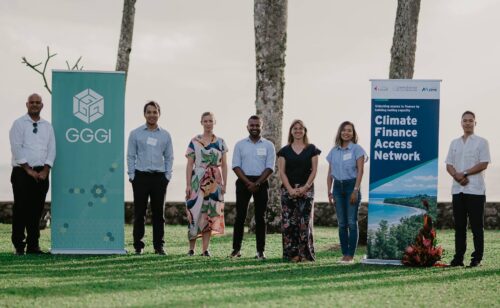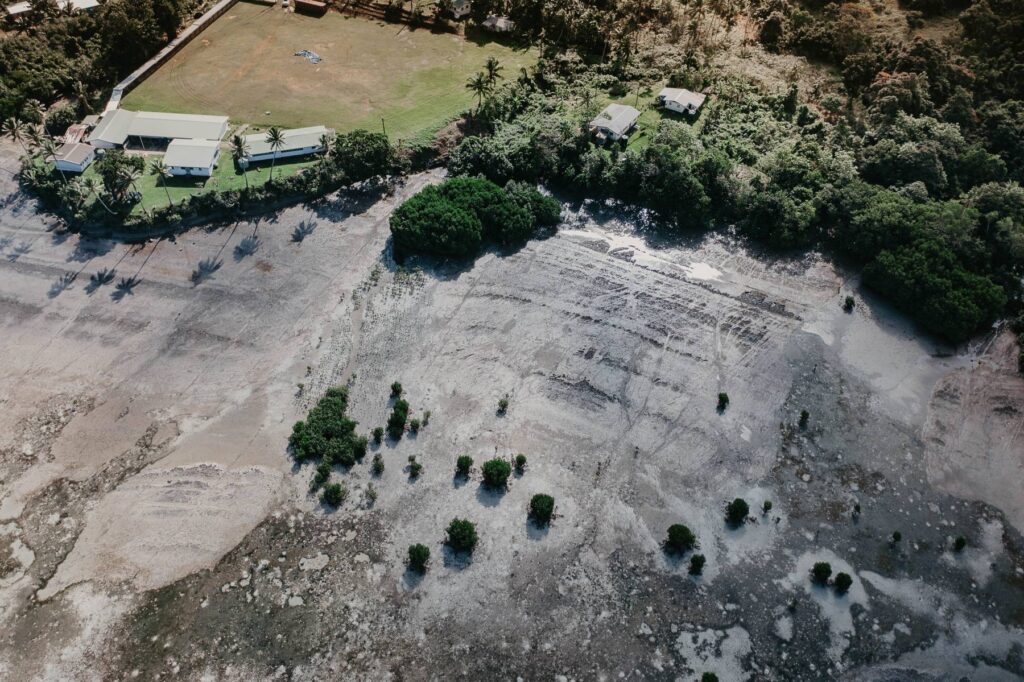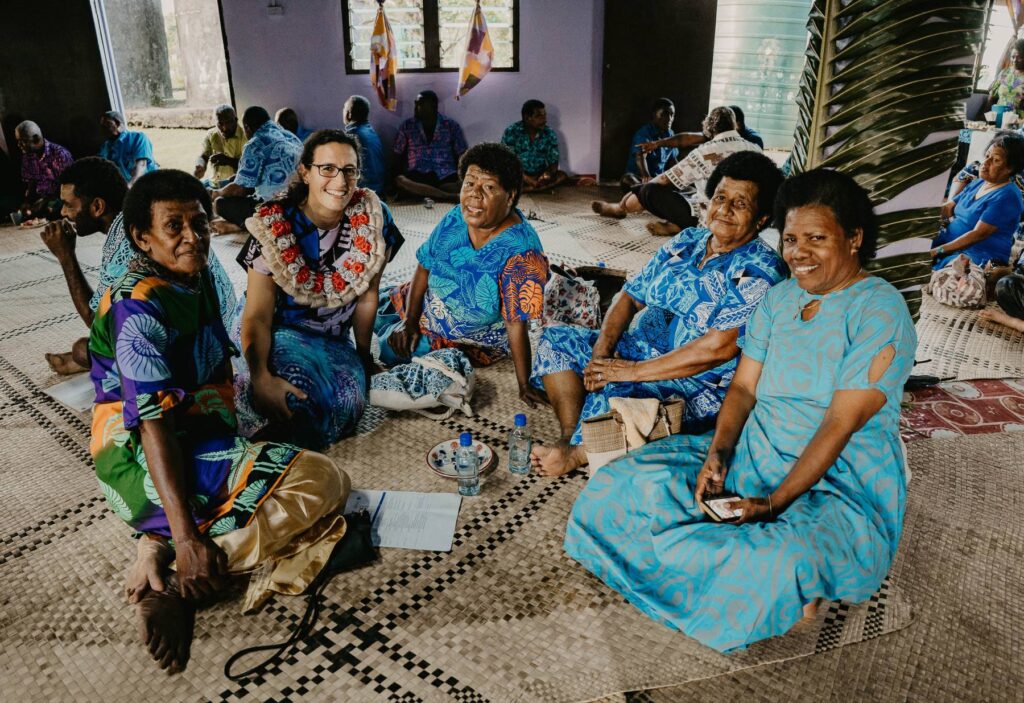
Voices from the Front Lines: Unlocking Climate Finance in the Pacific
The Pacific Islands — cloaked in green, surrounded by mesmerizing blue oceans, and home to more marine species than any other ocean on the planet — play an integral role in global food security and the fight against climate change. But despite contributing least to global carbon emissions, Pacific Islanders are among the most vulnerable to the effects of climate change. Rising sea levels; intensifying tropical storms, typhoons, and droughts; coastal erosion and flooding; rising temperatures; changing ocean currents and abnormal weather patterns are all heavily impacting the islands.
During the Climate Finance Access Network (CFAN) team’s visit to Fiji, signs of land erosion were ubiquitous. Erosion is happening so quickly that the local villagers cannot wait for official intervention. They are taking the matter into their own hands – something that the Pacific Islanders have been doing for many years when it comes to fight against climate change. To combat erosion, they are building sea walls and planting young green mangrove trees to stand strong in the sand along the shoreline.
These interventions are part of the mangrove management enhancement and development efforts of the Navakavu Mangrove Reserve Eco Tourism Park, and part of a proposal recently approved by the UNDP Blue Accelerator Grant Scheme submitted by Shelveen Kumar. Kumar is a CFAN advisor, embedded in the Fijian Ministry of Economy. He’s one of eight advisors in the Pacific focused on unlocking access to climate finance by developing project concepts and proposals and building bankable project pipelines in countries.
CFAN supports developing countries in unlocking climate finance by cultivating a network of highly trained climate finance advisors. CFAN’s Pacific advisor cohort, recruited by Global Green Growth Institute (GGGI) as CFAN’s implementing partner in the Pacific, completed multi-month climate finance training and have been embedded in relevant ministries to advance regional climate priorities. Six months into their terms, we’re sharing some of their experiences and lessons learned from working on the ground.

Soil erosion in the coast of Navakavu, Fiji
It Is All about the People
External financial support is critical for the Pacific to build resilience against climate change. However, the climate finance ecosystem has become increasingly complex and hard to navigate and Pacific Islanders have repeatedly raised concerns that the current climate finance architecture is failing to meet their urgent needs. “The [Green Climate Fund] paperwork is higher than the sea-level rise in Tuvalu,” read one complaint by a local policy and decision maker on the cumbersome nature of preparing project proposals.
As a climate finance advisor trying to steer through this sea of complexity, it is easy to get caught up in coordinating across different stakeholders, international organizations, and multilateral funds while trying to develop a project for funding. Despite this, climate finance practitioners continue to do the work — for people and communities. As Andres Toro, CFAN advisor to Vanuatu, said, “To me it’s all about the people. What can I learn from them? What can be enhanced with local knowledge?”
Building trust and strong relationships with local communities is key to achieve the best outcomes for communities because meaningful partnerships are foundational to climate resilience. It is important to engage with local communities from the early stages of project development and listen to and learn from their experiences. We must support and promote the welfare, positive contributions, and leadership of local communities in developing climate change projects based on traditional knowledge and practices, in a manner that is accessible, rights-based, gender-responsive, culturally appropriate, and inclusive.
A Fijian citizen himself, Kumar noted that “for anyone coming to the Pacific, you need to really understand the country context.” The Pacific Island countries are diverse in culture and traditional knowledge, both of which are deeply linked to their livelihoods. These two components have enabled the people of these nations to survive on the islands since ancient times. Advisors working on project development strive to learn from the locals when implementing adaptation and mitigation projects across village, island, and national levels.

Warm welcoming of CFAN and GGGI by the Yavusa Navakavu Development Trust to sign memorandum of understanding
Getting to a Good Plan
The climate finance landscape is highly fragmented due to varying stakeholders involved at different levels, which leads to a lack of strategic alignments, information gaps, duplication of efforts, and implementation inefficiencies. CFAN advisors highlighted the need to improve climate finance coordination among different stakeholders across international, regional, and national levels to effectively influence results on the ground. Charlotte Sheppard, CFAN advisor to Samoa, the Solomon Islands, and Tuvalu, observed that “one of the problems with access to finance is that there isn’t a good plan… More is needed in the project structuring and planning and getting the right implementing partners and entities together to convince the funders that they can carry out the projects.”
Tonga’s CFAN advisor, Lano Fonua, agrees. “There is a need for more strategic alignment and better programming of technical assistance and capacity development interventions,” he said. Fonua believes that despite the high number of readiness interventions in countries, they have not led to the expected pipeline of climate projects. “One root cause is the existence of gaps in the government’s systems, processes, data collection, and information sharing with regard to climate change financing and project development,” he explains. “Identifying these gaps and aligning technical assistance to address them would enable a more coordinated and programmatic approach to capacity development and readiness in general. That, in turn, could provide greater transparency on the pipeline of priority projects.”
A recent report developed by CFAN and commissioned by the United Nations Office of the High Representative for the Least Developed Countries, Landlocked Developing Countries and Small Island Developing States (UN-OHRLLS) on challenges and opportunities in accessing climate finance for Small Islands Developing States (SIDS) proposes establishing a “hub” dedicated to SIDS to support coordination, data collection, and mobilization in SIDS regions.
Lasting Capacity, Lasting Relationships
CFAN advisors recognize that one of the main challenges faced by the Pacific SIDS in effectively accessing development and climate finance lies in their human and technical capacity constraints in meeting donors’ proposal standards and reporting requirements.
Kumar mentioned that limited capacity to absorb increasing amounts of climate finance and development assistance leads to a hesitancy to take on large-scale development projects. He recommends looking at blending and scaling up across funds and utilizing third parties to implement projects, relieving internal pressure on public resources while still working closely with governments. Additionally, he highlighted the importance of building capacity in relevant ministries by funding roles, recruiting local staff, and addressing staff retention in key ministries. “In the Pacific, we don’t really have technical expertise locally available. So, it’s mostly consultants flying in. I think that’s the gap that CFAN is trying to fill. I feel empowered that we are able to do that.”
According to Phonesavanh Latmany, CFAN advisor to Papua New Guinea, “As CFAN advisors, I think we have very strategic positions in terms of supporting our government partners. For instance, I’m sitting within the National Designated Authority office, so I interact with them quite often, and talk to them about the different financial resources or climate funds. I think that sort of relationship building is quite important. And I think all the CFAN advisors have that as part of our job — building relationships with our partners and supporting them through the processes.”
Stronger Together
The CFAN advisors highlighted the benefits of using a cohort-based model for advisor training. This allows for building stronger connections between the advisors across the Pacific. With a cohort-based model, CFAN advisors practice stronger collaboration and share knowledge and expertise from different perspectives. This model could also potentially assist the Pacific in implementing more regional projects.
CFAN advisor to Samoa, Solomon Islands, and Tuvalu, Walter Malau, said, “There is an appreciation that we all come together from different backgrounds in our professional [lives] and diverse cultures, but that doesn’t stop us from discussing and catching up. And in our network, we tend to share and listen to each other and bring in examples from our countries, successes, challenges we are dealing with, stakeholders, and examples of making progress in our work.” The advisors meet weekly to share projects they are working on, problem solve together on challenges they are facing, and seek areas where they could collaborate. Malau is currently developing a concept note on providing safe homes for atoll island communities in the Solomon Islands — his first concept note submitted to multilateral funds. This is similar to a project on a solar and resilient housing program in Fiji that Kumar recently submitted to the Green Climate Fund.
In a short period, CFAN advisors have accomplished a great deal. Beyond integrating into countries and completing multi-week training on climate finance, as of August 2022, they have submitted 10 project concept notes for multilateral financing worth a total of US$52 million. These projects cover climate-smart agriculture, solar and resilient housing, grid-connected solar and battery storage, and more. CFAN advisors acknowledge the region’s challenges in accessing climate finance but are hopeful about the future for the Pacific countries. They look forward to seeing projects translate from paper to actual implementation and helping their communities become more resilient to climate change.
CFAN advisors will be present at the 27th session of the Conference of the Parties (COP 27) to the UNFCCC in Sharm El-Sheikh, Egypt, to share more about their experiences working in countries. You can also follow their work and accomplishments through CFAN’s social media handle: @CFANadvisors.
Funded with an initial CAD $9.5 million contribution from the Government of Canada, CFAN is a demand-driven initiative tasked with unlocking climate finance in developing countries.